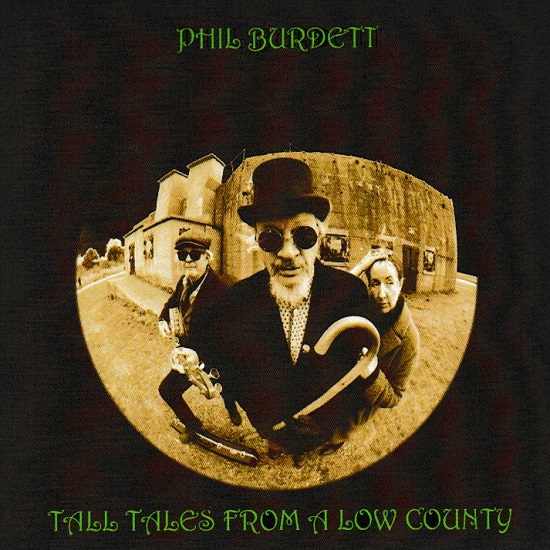
Not so much of an album review as a dispatch from the front lines. Since his serious health difficulties five years ago, Phil Burdett’s become the prolific polymath of the Thames Estuary. He’s always been a singer-songwriter of the highest calibre as a live and recorded artist, but he’s broken out of those shackles since with 2016 by publishing and performing poetry, writing prose, directing film and doing some painting as well. The latest news is that he’s released “Tall Tales from a Low County”, a companion piece to last year’s “Folkmares” album with a similar theme of the East End Essex diaspora, the demographic transition from London’s dockland to the estuarial towns, old and new.
“Tall Tales from a Low County” features two long-term Phil Burdett collaborators, Steve Stott (playing fiddle, mandolin, banjo and ‘weird guitar’) and Colleen McCarthy (piano and vocals). Alongside Phil’s contributions on guitar (including, unusually, a bit of electric), programmed percussion, organ, accordion and some digital orchestration, they create soundscapes that match the meandering progress of the Thames and various points along its course. And you’re never too far away from some birdsong (or even seagulls) and tidal susurration along the way.
As with all of Phil Burdett’s albums, you can listen on a superficial level and thoroughly enjoy the experience, but the deeper you dig into the lyrics, the more satisfying it becomes. Phil puts the time into researching his themes; if you do the same you’ll enhance your experience of the entire piece, pulling together history, sociology and geography to tell some of the human stories of the river that made London and the south-east, from its meandering source to its meeting with the North Sea.
“Tall Tales…” opens with an ethereal exploration of London’s lost rivers, “Hush River Blind”, the arrangement conveying the menacing, claustrophobic atmosphere of subterranean rivers in culverts under England’s capital, all ultimately feeding out into the Thames on its journey to the estuary in the same way the songs broaden out to cover the lore of the river and the people that exist in a state of mutual dependence with it. I won’t force-feed you my opinions of every song (just take my word that they’re all good) but I will pick out some of my favourites.
The second song “Lighterman” has more space in its arrangement led by Phil’s chiming acoustic with the accordion (Phil again) and fiddle creating a sea shanty feel emphasised by Colleen and Phil’s layered backing vocals. The slow pace reflects the speed of the job done by the lightermen (now largely vanished), who moved the cargo from ships moored in the Thames to the shore (usually unpowered) before the heyday of the docks and their subsequent decline as a result of container ships. It’s a song in praise of people who did a highly skilled job using mainly the tides until a ‘better’ method evolved.
“Plotland Pioneers” is Phil Burdett at his very best, combining personal memories with social history in a slow country rock setting with a subtle combination of electric and acoustic guitars capturing a 1979 vibe perfectly, which is used as a narrative framework to timeshift back to the end of the nineteenth century, when land around Laindon that was uneconomical to farm was auctioned off in plots and bought mainly by people from the East End and developed as holiday or retirement homes. The infrastructure was non-existent (and don’t even ask about planning permission), but somehow the pioneers made it work until the area became part of the Basildon New Town project and was demolished from 1949 onwards. There’s even a reference to the companion album, “Folkmares”, slipped in there as well.
“Bow Bells, Shoebury Gun” is in the same mould, combining the progress of the river to the North Sea with a very personal spoken word memoir of childhood days in Basildon. It’s taken at a very leisurely pace as it drifts backward and forward in time and place, creating a haunting feel and a sense of displacement and exile. There might even be a slight nod in the direction of Leonard Cohen with the line: ‘Where are the cracks through which the sunlight shone now everything is gone?’ It’s a tour de force.
Almost everywhere you look on the lyric sheet (oh, the packaging’s superb as well, with stunning photography by Robert Shaw), there’s an interesting reference: Joseph Conrad, William Blake, the Great Dock Strike, the Crow Stone and London Stone (the Thames boundaries of the City of London) and so on. And could the line ‘The union’s gone and the chancer’s beer is tasteless’ be a reference to anyone other than Tim Martin? I do hope so. At a time when curmudgeonly old musicians are making songs in support of the anti-vaccine lobby and COVID deniers, maybe it’s time to listen to a songwriter that still has something interesting to say and an interesting way of saying it.
“Tall Tales from a Low County” is out now and you can show your support for a genuine British original by buying it here. Phil’s playing a gig to launch the album in St Mark the Evangelist Church, Southend on Saturday September 11th and I hope I’ll see you there.
And the rest of the news? Phil’s directorial film debut is ongoing (with cameo appearance from Wilko Johnson as a vicar) and the third album of Phil’s Cornish trilogy is now in pre-production with studio recording coming up fairly soon. He’s not hanging about.
Here’s a video clip for “Lighterman”:
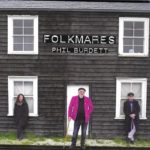 Phil Burdett; the eternal iconoclast. The most characteristic line of the album for me is ‘antagonize a purist’ from the album’s closing song “Newport Electrics”. The song, and the message, are built around Dylan’s infamous electric performance at the Newport Folk Festival in 1965, although the intro hints at the Hendrix performance of “The Star-Spangled Banner”. It doesn’t actually typify the album; it’s twice as long as most of the songs and three times longer than some and it has a psychedelic, hippy-trippy vibe with Indian percussion and hints of Ravi Shankar’s influence. You can fill your boots checking out the Dylan references, but there’s more buried there in the story of how music constantly evolves in the line ‘the strummer’s fix is in’ – is it the frontman of The Clash or a general reference to three chords and the truth guitar players? You decide.
Phil Burdett; the eternal iconoclast. The most characteristic line of the album for me is ‘antagonize a purist’ from the album’s closing song “Newport Electrics”. The song, and the message, are built around Dylan’s infamous electric performance at the Newport Folk Festival in 1965, although the intro hints at the Hendrix performance of “The Star-Spangled Banner”. It doesn’t actually typify the album; it’s twice as long as most of the songs and three times longer than some and it has a psychedelic, hippy-trippy vibe with Indian percussion and hints of Ravi Shankar’s influence. You can fill your boots checking out the Dylan references, but there’s more buried there in the story of how music constantly evolves in the line ‘the strummer’s fix is in’ – is it the frontman of The Clash or a general reference to three chords and the truth guitar players? You decide.
As always with Phil Burdett albums, you can spend all the time you have unpicking the words and looking for the references. I’m not doing it for you, but I’m just saying it might be worthwhile. Phil will argue that lyrics aren’t poetry because they rely on the music to make them work, but let’s just say they’re written in a poetic style. We can probably agree on that.
“Folkmares” came out of a difficult time for Phil; he has a work ethic that won’t allow him to stop. If he can’t write songs, he’ll paint or write poems or find some other way of creating art. What’s certain is that it won’t be boring or bland: guaranteed.
It’s a home studio recording with Phil singing, playing guitars, keys, bass, percussion and harmonica, while Steve Stott (fiddle and mandolin) and Colleen McCarthy (vocals) supply the folkier elements and a more country, string band sound. Phil’s influences are many and varied and most of them poke their heads over the parapet at some point in the album’s fifteen (yep, fifteen) songs. It’s a nod to the folk tradition that almost a third of the songs on the album are in 3/4 time, and those are some of the most poignant songs. I bet you want to know what some of the songs are about as well.
The album looks back to an earlier time in Phil’s life, not through the rose-tinted sunglasses of nostalgia, but the telephoto lens of realism, with absolutely no filters. The songs are set in either central London (Soho, Camden, you get the picture) and south-east Essex (Basildon and Canvey). The London settings have the feel of a Patrick Hamilton novel fifty years on at the start of the Thatcher era (looking forward as well in “Albion Caustic”), with scenes in pubs and an interesting array of characters. There aren’t too many happy endings either.
The Essex songs are set in a slightly earlier and maybe more innocent period, shining a bit of light on a time of life where everything seems possible yet impossible at the same time. We’ll start there for favourites. “New Factory Hand” (in ¾ time) evokes with concise phrases the stark reality of working life in the late sixties and early seventies and how we escaped from it, while the song following, “From a Van on the Coryton Road” is set just before the Thatcher era capturing the drudgery of dead-end jobs around Canvey Island and again the escape, ‘When Friday rolled by we would lead our wage packets to drink’.
I’ve already mentioned “Newport Electrics” a very personal take on the history and hypocrisy (bit of Jane Austen there, sorry) of the folk scene while “The Last March” does the same for the march and demo movement of the mid-eighties and the ‘I was there’ pose. You could update it for 2020 and call it “The Last Petition”. While we’re with the stupid ideas, the busker’s anthem “Flatpicking Sorrows on Borrowed Guitars” could be filmed by Wim Wenders as “The Busker’s Hatred of Brown-Eyed Girl”. Just sayin’.
What else? The packaging of course. Phil likes to include a lyric booklet and this time the photography (by Steve Stott and Rob Shaw) and the design, layout and graphics (by Steve Stott) combine to create a perfect setting for the lyrics. Bloody good job all round, I say from the Southend massive and a namecheck for John Bulley because I don’t want to leave him out.
While we’re all going stir-crazy, why don’t you treat yourself to a big helping of lyrics that will actually make your brain work and some really interesting musical settings.
“Folkmares” is out now and it’s available here. You won’t spend a better tenner before the lockdown ends.
Bit of a video taster before you go? Thought so:
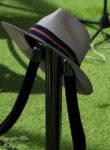 Just let me be completely serious here, the whole idea of reviewing albums and gigs and doing live music photography is something I wouldn’t have dreamt of ten years ago. Whatever gods you believe in, I will thank them for this opportunity. Every album I hear or gig I go to is another bonus and I truly appreciate it; I’ve made many friends as a result of doing this and had some wonderful times. Every year for the last five years or so, I’ve had few moments that stop me in my tracks and they’re still coming. Here are a few from 2019, in no particular order.
Just let me be completely serious here, the whole idea of reviewing albums and gigs and doing live music photography is something I wouldn’t have dreamt of ten years ago. Whatever gods you believe in, I will thank them for this opportunity. Every album I hear or gig I go to is another bonus and I truly appreciate it; I’ve made many friends as a result of doing this and had some wonderful times. Every year for the last five years or so, I’ve had few moments that stop me in my tracks and they’re still coming. Here are a few from 2019, in no particular order.
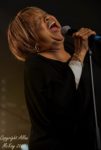 Mavis Staples @The Roundhouse
Mavis Staples @The Roundhouse
It wasn’t the first time I’ve had the opportunity to photograph Mavis; that was Cornbury Festival last year. This was different; it was the full-on show, the proper gig experience. Proper soundchecks, full-length sets and not having to dash off to shoot another band after the first three songs. And it didn’t hurt that the support for Mavis’s two gigs in England was Stone Foundation, my favourite current UK soul band; they rose to the occasion, powering through a tight set and grabbing the attention of an audience that had mainly come to see Mavis as part of the Innervisions Festival. I’d managed a couple of decent shots of her at Cornbury, but you never pass up an opportunity to photograph a legend again. Three songs from the pit, including a few that I’m still happy with, and then what? Get to the mixing desk, stand in front of it and enjoy the force of nature that is Mavis Staples and her band. The songs always had power, the band are totally on it and Mavis’s voice is undimmed by age. What a night.
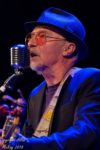 Interviewing Graham Parker
Interviewing Graham Parker
Bit of context here. As a student in the late seventies (I know, you work it out), I had access to a lot of gigs and I was just getting into gig photography (Olympus OM-1, if you’re interested). I spent a fair amount of time as a DJ with current MusicRiot contributor Steve Jenner. As a DJ at that time in Students’ Unions, you got a lot of freebies. One of the freebies that grabbed my attention was an EP by Graham Parker called The Pink Parker EP (the original limited edition was on pink vinyl) and it ignited a life-long love of this guy’s music. He’s now one of several musicians that I’ve photographed at an interval of four decades; you get the picture, I’m a fan.
Cutting to the chase, in February of 2019, a Graham Parker tour celebrating the fortieth anniversary of the album “Squeezing Out Sparks” was announced and one of the dates was The Foxlowe Theatre in Leek, one of my favourite small theatres in one of my favourite small towns, coincidentally the current hometown of Mr Jenner. Tickets were bought and as the year went on, I thought it might be a good idea to collaborate with Steve on an interview with GP if we could swing it. Turns out (with the intervention of Neil Sheasby from Stone Foundation), we could. So, on Friday October 22nd in Leek, I found myself sitting with my oldest mate Steve Jenner opposite Graham Parker with a microphone between us. If you’ve got half an hour to spare, you can listen to it here:
It’s the first time I’ve been happy to use an interview as a podcast, rather than transcribing the whole thing. It was a bit of moment.
 Sam Tanner album launch @The Half Moon
Sam Tanner album launch @The Half Moon
Heard of Sam Tanner? You really should have, he’s the man. Sam sings, writes songs and plays keyboards, but that really doesn’t do him justice. He’s the funkiest keyboard player I’ve heard, his songs are incredibly powerful and then there’s the voice. As a keyboard player and soul singer in the UK, the obvious comparison is Paul Carrack. I’ve seen both several times and I have to say my money’s on Sam. I first got to hear of him as a member of Mollie Marriott’s band, then as member of Brother Strut (check out this Ed Sheeran cover) before bumping into him at various gigs around town. All of that talent and it turns out he’s a really nice guy as well.
For the launch gig for his solo album he pulled out all the stops (thinly-disguised organ player gag) with a full band, horn section and backing vocalists (Mollie Marriott and Izzy Chase). This was a quality line-up with the kind of players that could follow any changes and sounded incredible. Sam was on top form vocally and even dealt with audience members talking in his trademark gentle way: “If you’re going talk along, can you do it in B flat because that’s the key the next song’s in…”. Superb band, superb vocals and lovely atmosphere; I floated back to Putney station.
 Dana Immanuel & the Stolen Band @The Forum
Dana Immanuel & the Stolen Band @The Forum
While I’m ‘fessing up to all the bands I love, I can’t miss out Dana Immanuel and the Stolen Band. I love these people as artists and as people. In October, I saw the band three times. Each gig was special in its own way, but a support set at The Forum with a full house was a huge opportunity. The band supported Polish eighties punk band Kult who still have a huge following in the UK. It can be difficult playing support to a band with a hugely partisan following, but Dana had a secret weapon (besides having a great band). Fiddle player Basia is Polish and did various links and introductions in her home tongue, which the audience loved. It’s a fabulous feeling to see one of your favourite bands get a rapturous reception at a big gig on their own manor. I suspect I’ll be at a few more Stolen Band gigs in 2020.
 Poetry
Poetry
I know it seems unlikely, but I got back into poetry. Over the last few years, I’ve become a fan and friend of the songwriting colossus that is Phil Burdett. It’s been no secret that Phil’s had some issues over the last few years and working on his poetry is something that’s been therapeutic. This year, Phil published a volume of poetry and prose (it’s very good and you can buy it here) and launched it at The Railway Hotel in Southend-on Sea with a performance featuring spoken word and songs aided and abetted by his long-time collaborator Steve Stott, playing the usual mandolin and fiddle. I’d forgotten how good it is to hear poetry performed live and wasn’t remotely surprised at the way Phil aced his first live recital. And the songs with Mr Stott sounded bloody good as well. As if this wasn’t enough, Ralph Dartford supported Phil with the launch of his latest volume, “Recovery Songs” and also went down a storm. The audience was perfect; totally silent during the performances and noisily appreciative at the end of each piece
And there’s still more. A few weeks later, Ralph launched (no pun intended) his volume, “Recovery Songs” from a floating bookshop on the Regent’s Canal in King’s Cross, supported by Phil and Steve. Not quite such a captive audience, but great to see people walking along the towpath stop to listen. Those two volumes are probably the first new poetry I’ve bought since “The Mersey Sound”. Another bonus was that I had the chance to have beer with some very interesting musicians, which is a theme that crops up elsewhere in these High Fives. There might be a good idea buried somewhere in that.
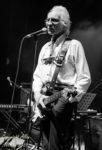 Nostalgia and a record
Nostalgia and a record
I can’t resist a bonus ball this time, inspired by the Graham Parker interview. In the same year that I first saw Graham Parker, I also saw a band from Birmingham that I’d heard a lot about, The Steve Gibbons Band. Imagine my surprise when I turned up to interview Southside Johnny at Shepherd’s Bush Empire in March to discover that Steve Gibbons had been added to the bill at short notice. Forty-two years isn’t my personal record for length of time between gigs I’ve seen an artist at; it ties with Brinsley Schwarz as a member of his band and as a duo with Graham Parker, but it’s quite impressive. My options for beating that record are pretty limited now; I think it might come down to seeing Ian Gomm or Billy Rankin again – just sayin’ guys, there’s a record to be broken here… To make everything perfect on the day, the interview went really well and the gig was absolutely storming. I love this job.
All images except Phil’s book cover courtesy of yours truly.
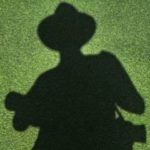 We asked Allan to share his favourite five photographs of the year and got the response we expected. ‘How can you pick favourites? It’s like asking a parent who their favourite child is’, and lots more in that vein. We eventually got him to agree to split them into five favourite monochrome and five favourite colour photos. Too good to be true really; it was, because he selected ten nice monochromes for us and said he couldn’t break it down any further. But surely ten’s just two sets of five; could we split them up? Amazing; five are male performers, five are female so here we go with the male performers, in no particular order:
We asked Allan to share his favourite five photographs of the year and got the response we expected. ‘How can you pick favourites? It’s like asking a parent who their favourite child is’, and lots more in that vein. We eventually got him to agree to split them into five favourite monochrome and five favourite colour photos. Too good to be true really; it was, because he selected ten nice monochromes for us and said he couldn’t break it down any further. But surely ten’s just two sets of five; could we split them up? Amazing; five are male performers, five are female so here we go with the male performers, in no particular order:
Steve Stott
First thing I’m saying about this is that I know Steve quite well. He’s part of a scene in Southend-on-Sea and is a very gifted fiddle and mandolin player; he’s also a really nice guy. I got to know Steve because he collaborates extensively with Phil Burdett (and you really should check him out). This shot was taken upstairs at The Railway Hotel in Southend at the launch of volumes of poetry by Phil Burdett and Ralph Dartford. Phil decided to intersperse readings of his poems with some of his songs, accompanied by Steve, meaning that Steve had some onstage downtime. And the point that I’m approaching tangentially here is that the interesting stuff doesn’t have to be front and centre; Phil is a riveting performer and I loved the expression as Steve watched him recite:
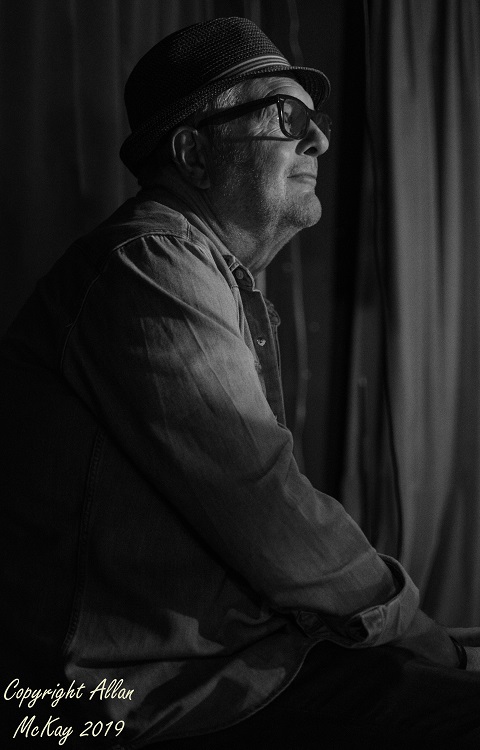
Sam Tanner
There’s a bit of a theme emerging here; Sam’s a lovely guy as well. He’s also a great keyboard player and has one of the most soulful voices I’ve ever heard. The first time I saw Sam, he was part of Mollie Marriott’s band as co-writer, keyboard player and backing vocalist. He’s also one of the members of the funk supergroup Brother Strut (check them out live and on record) and in 2019 he released his solo album. This shot was taken at the sold-out launch gig for the album at The Half Moon in Putney with an absolute all-star band and an audience packed with great musicians as well; Sam didn’t disappoint and I think this picture captured something of the essence of one of the UK’s finest soul singers:
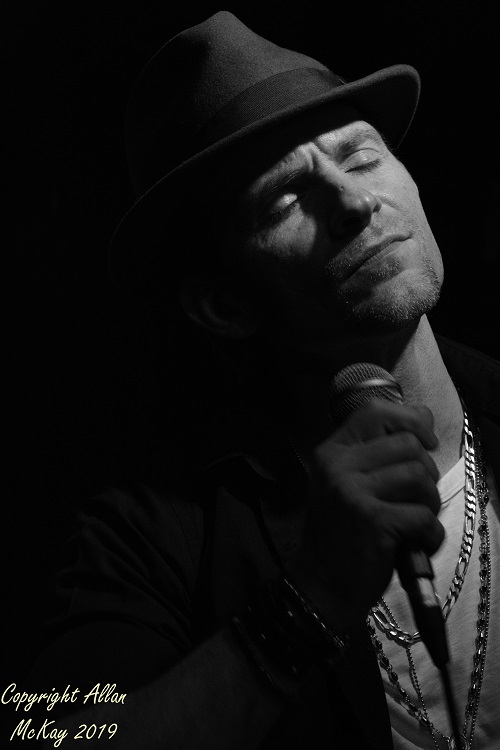
Red Berryn (Dominic Cooper)
My first encounter with Dom was at Leek Blues & Americana Festival in October 2018. I grabbed an interesting shot during his set and we got acquainted online. What Dom does is a tribute to the godfather of rock ‘n’ roll, Chuck Berry. This isn’t just any old Chuck Berry tribute; Dom’s totally committed, knows the Berry family and was actually invited to Chuck’s funeral. This isn’t just any of Chuck’s children out there playing his licks. This shot was taken in October 2019 at the same festival when Dom’s band supported the wonderful Little Victor at The Foxlowe Theatre. As Dom went into his splits routine, I got in close just as he shot a laser-like stare directly at the camera:
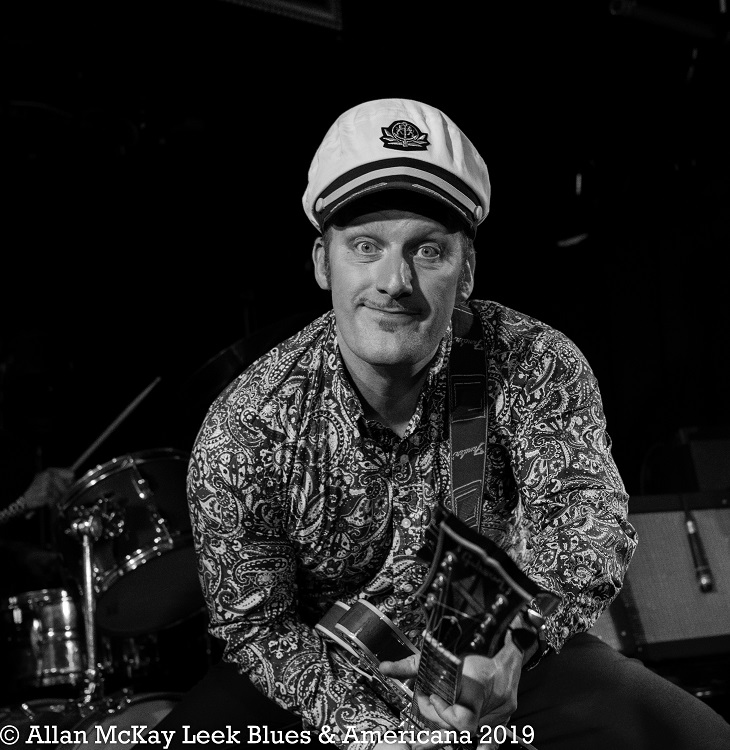
Mikey Christer
Social media has its faults, but sometimes it works wonderfully well. I photographed Mikey for the first time in 2017 when he played in Penny Riviera’s band (check her out as well) at her EP launch at The Hard Rock Café. On the back of one shot from that gig, Mikey got in touch and we’ve discovered since that we have loads of favourite bands and guitar players in common. When I heard that Penny was doing a gig at Slim Jim’s in Islington this year with Mikey in the band, it was a no-brainer. It’s interesting lighting there, but it works well with monochrome. It was great to meet up with Mikey and chew the fat and this was my favourite shot from the night:
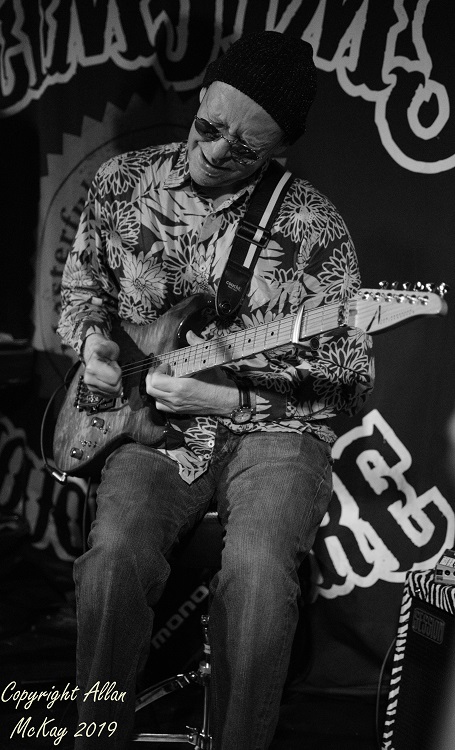
Connor Cockbain
I like to visit Brighton during The Great Escape for a day or so. The weather’s usually good and it’s nice to get away from The Smoke for a day. This year, the day was spent mostly in Caffe Nero watching some fabulous artists, but it’s always nice to pop over the road to The Mesmerist to catch some bands there. One of the bands I saw very briefly this year was The Post Romantics from Liverpool. I have some rules about gig photography and Rule One is that you don’t get the microphone directly in front of the singer’s mouth. Rule Two is that you can break the rules when you can justify it; the intensity of Connor’s stare in this shot is the justification. With minimal stage lighting and daylight through the windows, this was always a monochrome shot, which was a good thing because I had a chat with the band afterwards and they told me that Connor would convert it to black and white anyway:
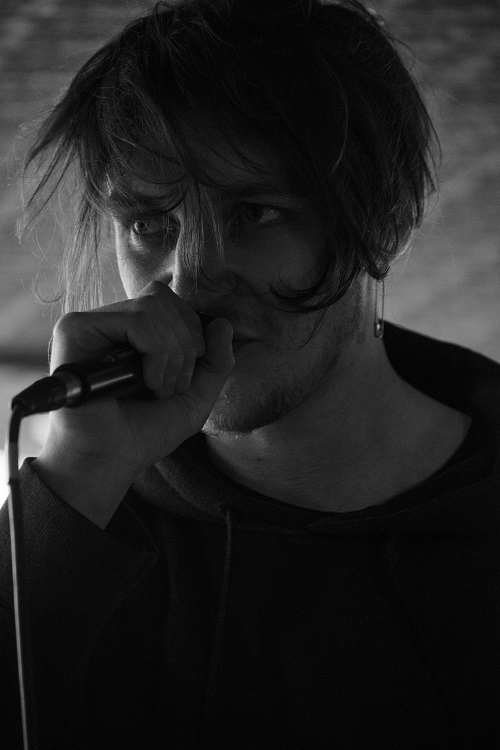
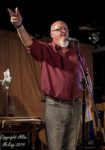 It’s fair to say that this isn’t really my manor. Yeah, I love The Railway Hotel in Southend for many reasons, the first being the wonderful bunch of people who choose to drink there. It’s an old-fashioned boozer that has successfully resisted any vogueish makeovers and remains a pub for people that like pubs (oh, and music, definitely music). It’s the kind of place where musicians, artists and poets (and the occasional photographer) meet up to drink, politely and non-judgementally discuss each other’s work and the work of others and drink and then drink some more. I may have fabricated a piece of that last sentence; you decide which bit.
It’s fair to say that this isn’t really my manor. Yeah, I love The Railway Hotel in Southend for many reasons, the first being the wonderful bunch of people who choose to drink there. It’s an old-fashioned boozer that has successfully resisted any vogueish makeovers and remains a pub for people that like pubs (oh, and music, definitely music). It’s the kind of place where musicians, artists and poets (and the occasional photographer) meet up to drink, politely and non-judgementally discuss each other’s work and the work of others and drink and then drink some more. I may have fabricated a piece of that last sentence; you decide which bit.
The reason for this trek out to Southend-on-Sea was the launch of books by Ralph Dartford and Phil Burdett and live performances by each of the authors. The last time I saw a live poetry event was nearly four years ago when Dr John Cooper Clarke supported Squeeze in Greenwich, which sets the bar fairly high. No worries on that score; Phil Burdett and Ralph Dartford had the goods and were ready to deliver.
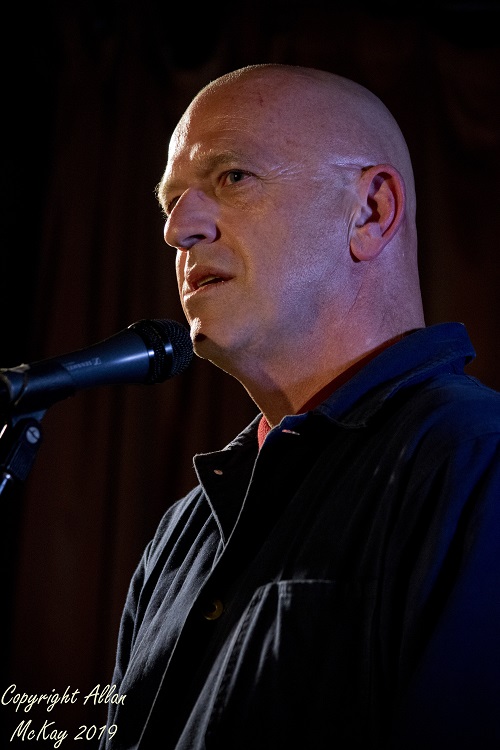
Ralph Dartford
It’s no secret that both of these artists have had their demons and maybe still do; that’s where the authenticity shone out in both sets. Ralph Dartford opened reading selections from his current volume “Recovery Songs” packed with pathos, humour and stark social realism (“Addict” set the tone for Ralph’s performance) joined up by a seamless narrative which demonstrated some superb comic timing. The audience was Phil’s home crowd, but they were attentive and hugely appreciative during Ralph’s set. I recommend the book and you can get it here .
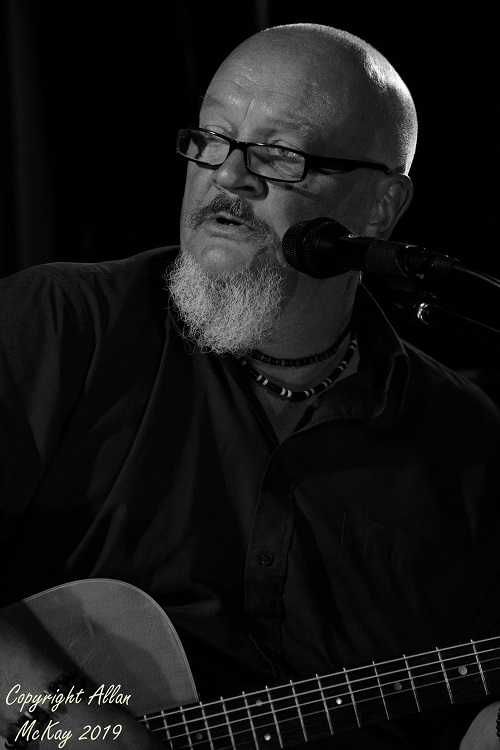
Phil Burdett
And the it was time for Phil Burdett, on a long and unpredictable journey from some very dark places indeed, to premiere his book of prose and poetry “Rhyming Vodka with Kafka”. Never one for convention, Phil delivered a mixture of readings from the book punctuated by songs old and new with support from fellow Southend legend Steve Stott on mandolin and fiddle (I’m not going to ask what happened to the banjo). For a first attempt at this format Phil nailed it, with the audience enthralled by the material and the delivery, pin-drop silent during the readings and wildly appreciative at the conclusions, particularly “The Bad Pub Guide” and “Dogs Accustomed to Loud Music”. Maybe a prophet can have honour in his own country.
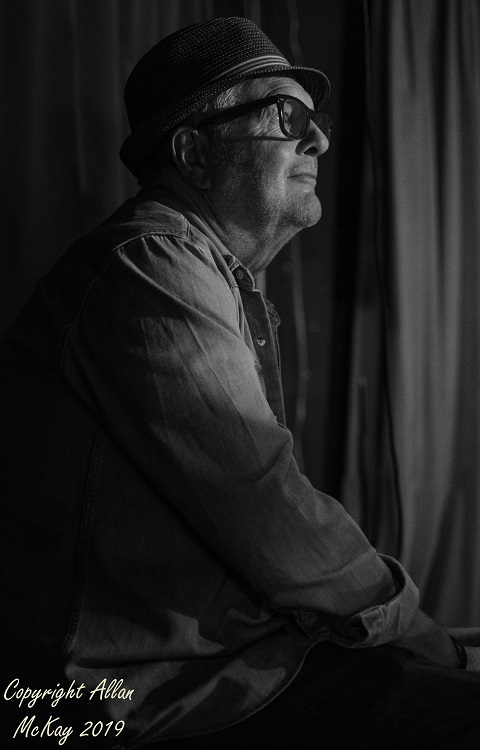
Steve Stott
Bottom line – I loved both performances; the audience loved both performances. I bought both books; a lot of the audience bought both books. It’s a long time since I’ve seen an entire audience so totally immersed in a performance. Thank you Ralph Dartford and Phil Burdett for making me realise that I need more poetry in my life.
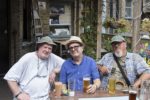
John Bulley, Steve Stott & Phil Burdett
When I get a message inviting me to visit the Railway in Southend to interview Phil Burdett, there’s only one possible response – when do I have to get there? Well, it was a mid-July Friday afternoon and the interview was livened up by the presence of Steve Stott, superb fiddle and mandolin player with Phil’s ever-evolving band. As always where Phil Burdett’s involved, it was interesting and sometimes controversial. I’ve left out some stuff to protect the innocent and the guilty – sorry Phil. Anyway, here’s how it went.
Allan – To start on familiar territory, with the last album, “Psychopastoral”, the thing that immediately struck me was releasing it as one continuous track, which gets round the whole iTunes download thing about single tracks or whole albums.
Phil – I’m sure they’re quaking in their boots at iTunes, it is a little victory but it’s the best I can hope for these days; Pyrrhic victories. I crave more Pyrrhic victories.
Allan – It took me a while to get this while I listened to it on my trusty old media player on continuous cycle as it went from the end straight back to the beginning, that the album was a cycle from the early morning to early morning a day later. I said at the time that I thought it was an outstanding piece of work, as good as anything you’ve done, I think.
Phil – I must admit, I was surprised, in the sense that it was different from what I used to do and I thought I’m either going to get some new people who like it and hate everything I’ve ever done or just everyone will hate it. You get so involved with it and you think you’re creating Wagner’s “Ring Cycle” and someone tells you ‘This doesn’t make any sense at all. What are you doing? You’ve lost your mind.’ It was pleasing that some people that liked what I do liked it and also some people some that haven’t particularly liked what I’ve done before seem to like it as well.
Steve – There’s probably some of the style that you used to do still remaining but combined with what you’re feeling now, so it covers both ends.
Phil – It’s like Tom Waits, but not quite such a radical change (that’s the next album). He lost a lot of his old fans who said ‘I liked him when he was drunk and living in a dodgy hotel and being a sort of dharma bum’, but you get bored with it. You can come up with many artistic reasons ‘I decided to embrace the idea of a concept album, in my late fifties…’, but basically you’re bored and I couldn’t get into music after the operation and the stuff I went through there. I started playing and did a couple of gigs and I felt like a Phil Burdett tribute act and I thought ‘What am I doing this for? I’m trying to write more songs like this.’ If you’re trying to write something don’t do it. So I thought let’s do something I can’t do, so we’re doing a film now.
I’ve got to do a film soundtrack; there will be songs, and that’s made me and write the songs because I think I need a song here to go over this bit of film.
Steve – There are some great songs, actually, from the demos I’ve heard.
Phil – Thank you. I hope you’ve got that on tape.
Allan – When we were chatting earlier, you were saying something the film being a bridge between “Psychopastoral” and the next album.
Phil – It is; there’s a lot of stuff I wrote in the hospital; morphine is a wonderful thing. I read it back when I sobered up and I thought I have no idea what this man is talking about, then it started making sense gradually and I realised that a lot of it followed on from what I did on the last album but I didn’t want it to be the middle album before I get really depressing with the hospital songs. I thought it wold be nice if it had some other element to it, so I thought ‘Let’s make a film!’ And directly, I thought there was no way I could make a film with on no money, no budget and no actors
Steve – Not strictly true…
Phil – So we are, and the fact that it’s actually happening is what’s keeping me going because even the prospect of doing the bunch of songs I had written felt like ‘Here we go again’ but this will spark it off and it’s also got a visual element to it, which I like the idea of. It’s not a series of music videos joined together, but you know The The did that film, I want it to have that sort of feel to it, but there’s a bit more drama involved (with a small d). We’re not talking “Apocalypse Now”, we couldn’t afford the helicopters…
Allan – And this is not the only film you’ve been involved with recently, is it?
Phil – No, I’m a regular luvvie now. ‘Just in between films, dahling’. It’s a documentary about growing up in Basildon. It was initially about brutalist architecture but it seemed to evolve when the director met a lot of artists from Basildon and they were all so different but they all had a similar theme of a love/hate relationship with Basildon so it was about that; it was good fun. He let me witter on then edited it down to something that was almost coherent, so I was quite pleased with that.
Steve – The people the film’s about, or featured in the film, have all left Basildon, haven’t they? There’s not a single one actually lives in Basildon now.
Phil – Which was hilarious. A lot of the Irish diaspora sing “From Clare to Here” and “Off to Dublin in the Green” but they’re all in Finsbury Park now. ‘We all love it but we’re not going back there. Fuck that.’
Allan – As an ex-pat Scot I completely get that. So, without giving too much away in terms of plot, what’s the story with the film?
Phil – Well the “Psychopastoral” album was basically, the narrative throughout was called ‘the long walk home’ and it’s an idea that I’ve discovered that many of the people I like, in music and literature and poetry, were always disappearing into the wilderness looking for something and what they were looking for was somewhere they could go home and that was the vague idea. A lot of them went to nature; it was based around William Blake, John Clare and Arthur Rimbaud. They all disappeared to derange their senses and they all found out they were miles from home: ‘I don’t feel at home and that’s what I wanted in the first place. I wanted to feel something.’ That’s the idea of that album and going through my traumas, I thought ‘They were all walking’.
John Clare famously walked from High Beach to Helpston; he walked from this lunatic asylum, going home to what he thought was his wife, but was actually his mistress, who had actually died anyway so it was an exercise in the definition of futility. I used him as the central character and Blake was another one who didn’t actually wander, but he wandered in his head. He was seeking angels in the trees; he was a cockney mystic, like the Russell Brand of his day. They were people who had ideas beyond their station and then realised that they wanted to get back to their station. It was the idea of comfort without being comfortable and when you derange your senses there is a sense that nothing makes sense and that can be liberating but, after a while, it becomes just derangement.
Rimbaud gave up altogether and became a gun-runner, Blake started to write about Heaven-knows-what and Clare lost his mind. He thought he was Shakespeare, he thought he was a boxer at one point. So I thought the halfway house of madness is fine because you get the little insights. When that’s happening, that’s great, but once you’re in an asylum and you’re thinking you’re Shakespeare, that’s really not useful as an artist.
Brian Wilson’s an example. Everyone thought ‘How on earth did he write “Good Vibrations”?’ Look at the stuff he wrote once he reached his destination and it’s like a five-year-old writing; wonderfully produced and interesting, but still like a five-year-old. I wanted to avoid that, so while I was in the hospital I wrote all this really depressing stuff because I thought everything was coming to an end but when I came out, I thought it’s not coming to an end but I couldn’t think in the same way as I did.
I thought it was a continuation. I’d lost a leg; Rimbaud lost a leg; Captain Ahab lost a leg searching for something and I grabbed the idea of the long walk home without a leg. That’s basically what this is all about. The further out you get, through drink, drugs, mysticism, anything, the less able you are to communicate it to people because they just think you’ve gone mad. But there’s a point just before it ends, before you do go mad, where it’s really interesting and that’s point I’m trying to hold on to in this film. And then it descends into depression and madness which is what the really interesting third album of the trilogy is about, but we’ll get to that later. I want to make it sound like Steely Dan actually because that’s the only way it’s gonna sell anything, either that or “Berlin” by Lou Reed, which I love, but it’s unlistenable to most people. This will make “Berlin” sound like Five Star
Allan– Looking beyond that, have you got any more plans for live stuff coming up?
Phil – It’s a bit tricky. I’ve lost all my mojo, although I don’t know what a Mojo is apart from a middle-class magazine for people who still like Crosby, Stills and Nash, but I don’t know. I’d like to do it but I want to have a point to it. It’s the same way I feel about the writing; I don’t want to do all this differently and feel I’ve changed my approach and then think ‘Oh, we’ll go and do some gigs’.
I’m having some poetry published at the end of the year and I’d like to include some of that in it because there’s a lot more poetry on the album. I wouldn’t mind dipping my toe in the water by doing stuff with Steve. We did a thing in a church, didn’t we?
Steve – Yeah, St Paul’s church. That was beautiful actually; it was purely acoustic, just a selection of songs that suited the venue. I suppose it was a kind of folky thing.
Phil – It was. I’d like to do that with some poetry, just to see if I can read the poetry. There’s a couple of poetry evenings here where you can just get up and read.
Steve – I think the other thing is to enjoy doing it rather than have the pressure of putting on a big gig and inviting lots of people.
Phil – When we planned to do the album launch gig, I got to the rehearsal and then thought ‘What the fuck am I doing?’. If it had all been rehearsed without me there, I might have been able to turn up and sing it but I was just sitting there thinking that I wanted to do something else, I didn’t want to be sitting there churning out this stuff. It felt it important that the whole process changed, and what I don’t want to do is just get back to ‘let’s do a gig then. All the creativity has stopped, let’s go and regurgitate it live with some feedback.’
Steve – We were doing gigs to promote the albums that we all produced, so the was the reason for the gigs.
Phil – And that’s why they’re all platinum sellers…
Steve – So the question is, do we really need to do that?
Phil – The Leigh Folk Festival, I’d like to do something there next year; not just for ‘Oh, Phil’s singing again and he’s got one leg. Oh, well done, Phil.’ Unless I have my head chopped off, I can fuckin’ sing; Ella Fitzgerald managed and I’m a better singer than she is. (Followed by a loud cackle).
Allan – I suppose the thing is, whatever you decide to do, you’ve got a great bunch of musicians working with you.
Phil – I have, just don’t tell my band. No, it’s true; I’m really appreciative of the musicians I’ve been able to talk into doing stuff for nothing because it would have been very difficult otherwise. I don’t like having a regular band. I used to but now I feel like everything we do something it’s a new band almost because we evolve with this particular bunch, except the drummers…
Allan – That’s all a bit Spinal Tap isn’t it?
Steve – I don’t even know if I’ll be on the next album…
Phil – You are, but you’re playing drums. Just don’t get the drummer’s job, because then you know you’re out. No, it is a bit Spinal Tap with the drummers. The last one did actually spontaneously combust.
Allan – I suppose, Steve, you’ve got double the chance of staying in the band, playing two instruments.
Phil – He sneaks in with a false nose and moustache. ’I’ve found a new fiddle player – fuck it’s Stott’
Steve – I try to make myself as indispensable as possible.
Phil – He does; he’s currently learning the oboe. It’s great; I’m getting in touch now because I’ve got these demos for the soundtrack of the film, so I’m going to send them the stuff and we’ll get together at some point and we’ll go and record. We’ll record it at Senor Al’s (Al Franklinos) because it’s my favourite place at the moment.
Steve – It ties in very nicely with “Psychopastoral” because of the park…
Phil – Well, the songs are very different from “Psychopastoral”, so I would like it to have some continuity and that will come from whatever Al does.
Steve – And it’s the location in Peckham, where Blake’s tree is, so there’s a catharsis there.
Phil – I’d like to point out that he used the word catharsis there. Always avoid the words journey and catharsis.
Allan – And what about some of the other collaborators on “Psychopastoral”?
Phil – One of the linking voices throughout this three-album thing will be Lyndon Morgans (Songdog) who did the narration for the album (“Psychopastoral”) and he’s going to do the narration for the film, the subsequent album and the album after that, so I’m really pleased about that. He’s an old Welsh wanderer, a Celtic wanderer and I need his Richard Burton-like authority. I’ll be making him read stuff he doesn’t understand for the next two albums.
Allan – I must admit, those links on “Psychopastoral” worked really well. His voice is fabulous for those.
Phil – It was the thing I was worried about because it was the thing that was going to make it different in a way and with my zero knowledge of arrangement of the quasi-classical stuff that’s going on in the background, it was either going to be great or it was going to be shit; there is no middle-ground. And it was almost great…
Allan – And is there anything else to throw in before we wrap it up?
Phil – There’s my collection of reggae covers… I’m looking forward, in a way, to finishing this trilogy because I don’t know what I’m going to do after that, and I never felt like that. It was always just ‘Here’s another bunch of songs that I like, I’ll record them with musicians I like and we’ll put it out and some people will like it and some won’t and then we’ll do the Leigh Folk Festival, then we’ll do this, then we’ll play The Railway’. That’s not going to happen, so I’m really interested in what I want to do after that.
Steve – I think we ought to base that on whatever the outcome of the film is. You might want to do another film.
Phil – I’d love to. I’m not sure anyone else will; I’m putting many people in to therapy with this film but that would be great. But then again, I might just think ‘I’ve done that’. I won’t do it just because I’ve made a film and invent some spurious half-arsed concept…
Steve – I was just trying to generate some work for myself…
Phil – I know you were. Talking of which, there’s a collection of folk-based songs that I want to record, so I might do that as a little side project with some real folk musicians. Radical concept, I know. It’s simple; you don’t rehearse, you just have to sober them up. That’s something I wouldn’t mind doing as a side project; it’ll be nice, it’ll be my stardust memory. It was so much better when we wrote songs…
And that was where I switched off the recorder before the descent into totally scurrilous alcohol-fuelled conversation. The Basildon film that Phil refers to is ”New Town Utopia” and it’s a fascinating exploration of the development of the town and its impact on the creative artists living there. You really should watch it.
 It’s difficult enough working out where to start a Phil Burdett review at the best of times without having to contend with an album that doesn’t actually start or finish anywhere. The clue’s in the song title “Sisyphus on Denmark Street”; the songwriter condemned forever to push a stone uphill. It could be worse; look what they did to Prometheus. The album cycles continuously from the birth of the dawn in “Net of Joy” to the dusk and senescence of “Dotage Train” and back to the beginning again, linked by the phrase ‘heavy miles to go’ in each song. Reincarnation without any upward or downward mobility and inspiration from the unholy poetic trilogy of William Blake, John Clare and Arthur Rimbaud.
It’s difficult enough working out where to start a Phil Burdett review at the best of times without having to contend with an album that doesn’t actually start or finish anywhere. The clue’s in the song title “Sisyphus on Denmark Street”; the songwriter condemned forever to push a stone uphill. It could be worse; look what they did to Prometheus. The album cycles continuously from the birth of the dawn in “Net of Joy” to the dusk and senescence of “Dotage Train” and back to the beginning again, linked by the phrase ‘heavy miles to go’ in each song. Reincarnation without any upward or downward mobility and inspiration from the unholy poetic trilogy of William Blake, John Clare and Arthur Rimbaud.
If you’re part of the generation that doesn’t listen to albums, this isn’t for you; “Psychopastoral” is designed to be heard in a certain order, start to finish and then again and maybe once more, just to be sure that it is actually a work of genius. Phil’s taken a simple approach to ensuring we listen to everything in the intended order; the entire album’s one track with songs connected by musical and lyrical fragments. Does it work? Bloody right it does; at just under an hour, the images, fragments and melodies rush past at breakneck speed then start all over again bringing fresh musical and verbal marvels to discover.
I could spend hours going into minute detail about every aspect of this album, but that’s not going to help anyone, so I’ll try to pick out some of the attention to detail that permeates every aspect of this beautiful piece of work. How about the musicians? The core of this ensemble has been with Phil for a few years now and each one brings their own individual talents to a great ensemble sound. John Bennett (guitar) is one of my local heroes; comparisons with Steve Cropper are more than justified – not showy, but everything fits perfectly. Steve Stott adds colour and texture with bright mandolin and melancholy fiddle and Colleen McCarthy’s backing and lead vocals are a pure and clear foil for Phil’s soulful growl. And of course, Russ Strothard’s melodic bass playing, Lyndon Morgan’s spoken word contributions and the samples and programming contributed by Al Franklinos.
Phil’s voice sounds as good as I’ve ever heard it and the words are as densely packed with meaning and allusion as ever. I’m not going to bore you with my amateur literary criticism, you can delve into the layers of meaning for yourself (there’s a lyric booklet as part of the CD package); you’ll find it packed with autobiographical references both pleasurable and painful alongside the odd skewed musical reference (‘needles of death and the damaged rum’ from “Sisyphus on Denmark Street”).
I’m a huge admirer of Phil’s work, particularly from “Dunfearing and the West Country High” onwards and with “Psychopastoral”, he’s made an unflinching, uncompromising album that flies in the face of convention in its stance on sequencing and playback. There are some memorably catchy songs embedded in the piece, and Phil’s determined that they stay embedded and we hear them as part of the overall creation. It’s an ambitious project, but it’s perfect in every little detail. Favourite album of the year so far? I think so.
“Psychopastoral” is out now you; can order it direct from Phil’s website.
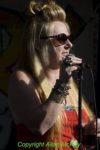 It’s not just Edinburgh that has a festival in August. What about Southend? Maybe not as fashionable but there’s a great arts scene around Southend and its satellites. So, on a beautiful sunny Saturday afternoon, why not head out to have a look at The Railway Hotel’s contribution to the Estuary Fringe Festival which is an afternoon session in the beer garden followed by more live bands inside in the evening. I got there just as the belly dancing was finishing and the stage was being set up for live music (with background music leaning heavily on blues classics and some nice Al Stewart songs).
It’s not just Edinburgh that has a festival in August. What about Southend? Maybe not as fashionable but there’s a great arts scene around Southend and its satellites. So, on a beautiful sunny Saturday afternoon, why not head out to have a look at The Railway Hotel’s contribution to the Estuary Fringe Festival which is an afternoon session in the beer garden followed by more live bands inside in the evening. I got there just as the belly dancing was finishing and the stage was being set up for live music (with background music leaning heavily on blues classics and some nice Al Stewart songs).
First on stage was Pick Yer Feet Up, or Eleanor Donne (fiddle) and Dave Murray (twangs and bangs) playing a selection of ‘bogus Bulgarian bangers’. It was relatively low-key but very melodic in an Eastern European way with a nice line in dry patter from Dave between songs. In the great old Python tradition of ‘now for something completely different’, next up was Dirty Captain Scott. What can I say? A twentieth-century estuary poet backed with cajon beats (and guitar towards the end of the set). The rhythms were insistent and the delivery, well, imagine Adele rapping and you’re most of the way there. A great set that you just couldn’t ignore.
Next? The Timlins (Matt and Victoria) played a lovely set of melancholy (maybe even miserable) songs, reminding me a lot of Turin Brakes and (bonus points if you remember this band) Budapest. Victoria’s keyboard filled out the textures created by Matt’s acoustic guitar and the harmonies were sublime. Personally, I like a bit of miserable; always have. Dead Air next, playing their first (and possibly only) gig, played a set of folky Americana with a female lead singer, acoustic guitar and mandolin backing and some lovely harmonies. If you wanted a backing track for an English summer day you wouldn’t go far wrong here.
And on to Phil Burdett, backed by long-term collaborators John Bennett (guitar), Steve Stott (mandolin and fiddle) and Colleen McCarthy (backing vocals). This was only Phil’s second live appearance after major surgery earlier in the year and he was a man on a mission, determined to get songs from his two (yes, two) new albums out there in a live setting. Throughout the set, the arrangements were a masterclass in understatement; the instruments created a framework that allowed the songs to shine. John Bennett is subtle and understated in a way that reminds me a lot of Steve Cropper; no fuss, but just try to imagine The MGs without the guitar parts. Even “New Greyhound Rag”, which was written as full band piece with bass, drums and various other bits of percussion is driven along nicely by the two guitars.
But just focus on the songs. From the opener “Sea Change” to “A Kind of Chalkwell Station Blue”, the short set was packed with melodic and lyrical invention. The lines ‘you switch the channel in your mind – and on the news voices buzz like cracked kazoos the needle stuck on tombstone blues’ are a great example of Phil’s ability to create a striking, evocative image. All delivered to perfection in Phil’s mellow growl. You really shouldn’t get music this good for free in a pub beer garden, even if the pub is The Railway.
I’m looking forward to seeing Phil officially launch “Humble Ardour Refrains” and “Shaky Path to Arcadia” on November 5th in Southend.
If you haven’t seen them before, here are some pictures of the event.
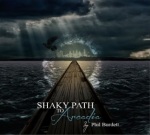 Every time I hear some delusional, no-talent wannabe on a TV talent show (not often, I admit) it should make me despair for music in the twenty-first century. The reason it doesn’t is that I know about people like Phil Burdett, a genuine visionary who’s about as far as it’s possible to get from the epicentre of what masquerades as the music business today. When I interviewed Phil about eighteen months ago in downtown Leigh-on-Sea, he told me that he was working an album to follow “Dunfearing and the West Country High” as the second part of the “Secular Mystic Trilogy”. Not only that but he was also working on another trilogy that would begin with “Humble Ardour Refrains”. So, on a budget of threepence-halfpenny and some lollipop sticks, he’s recorded two albums for Drumfire Records with some fabulous musicians from the Southend and Canvey area (more about the musicians later) and he’s releasing both of them at the same time.
Every time I hear some delusional, no-talent wannabe on a TV talent show (not often, I admit) it should make me despair for music in the twenty-first century. The reason it doesn’t is that I know about people like Phil Burdett, a genuine visionary who’s about as far as it’s possible to get from the epicentre of what masquerades as the music business today. When I interviewed Phil about eighteen months ago in downtown Leigh-on-Sea, he told me that he was working an album to follow “Dunfearing and the West Country High” as the second part of the “Secular Mystic Trilogy”. Not only that but he was also working on another trilogy that would begin with “Humble Ardour Refrains”. So, on a budget of threepence-halfpenny and some lollipop sticks, he’s recorded two albums for Drumfire Records with some fabulous musicians from the Southend and Canvey area (more about the musicians later) and he’s releasing both of them at the same time.
“Shaky Path to Arcadia” carries on where its predecessor left off, looking west towards the USA from Cornwall, but it’s a metaphorical and musical destination and it’s not the only direction the album goes in, geographically or temporally, before returning to Cornwall to complete the cycle. Without slipping in to ‘sixth-form-literary-criticism’ mode, I’m going to say that there’s a lot going on lyrically and the deeper you dig, the more precious stones you’ll unearth. The lyrics are strewn with references to American music and culture; there’s no mistaking the reference point for “Christmas in Casablanca”, but elsewhere there are references to Joe Hill, Billie Holiday, Dylan, Little Richard and many, many more. There are Dadaist references, travel references (trains, boats and buses and almost a plane) and if you look really closely, a lot of references to Basildon. There’s a lot of autobiography in there, but you need to know where and how to look.
Even without the lyrical content, you could listen to the album and be enthralled by Phil’s rich, powerful vocals and the performances of the band over a wide range of styles. From the mainly acoustic opening song, “Returning to Earth” to the counterpoint vocals in the coda of the album’s closer “I Dreamed I Saw Carl Wilson Last Night”, the band sounds superb. It’s ensemble playing at its finest; particularly on “Hellbound & Innocent” where a melodic bass line from Russ Strothard, an insanely catchy clipped John Bennett guitar hook and Jack Corder’s drums recreate the clickety-clack of the train on the track to perfection. Dee Hunter’s piano is the perfect foil for Phil’s voice on the haunting “Christmas in Casablanca” while Steve Stott’s fiddle on “Come Out Without a Hat (It’s Bound to Rain)” and “New Greyhound Rag” give an authentic country/bluegrass feel to the songs. And let’s not forget Colleen McCarthy’s lovely backing vocals and producer Mark Elliott’s esoteric samples.
“Shaky Path to Arcadia” is an example of how good an album can be when it’s put together by people who love what they do and they do it very, very well. Put the players together with another superb set of songs from the polymath poet of Westcliff-on-Sea and you’ve got a very fine album indeed. Any proper record collection should have some Phil Burdett in it and this is as good a place as any to start. “Humble Ardour Refrains” coming soon.
“Shaky Path to Arcadia” and “Humble Ardour Refrains” are both available to pre-order now from Drumfire Records.


